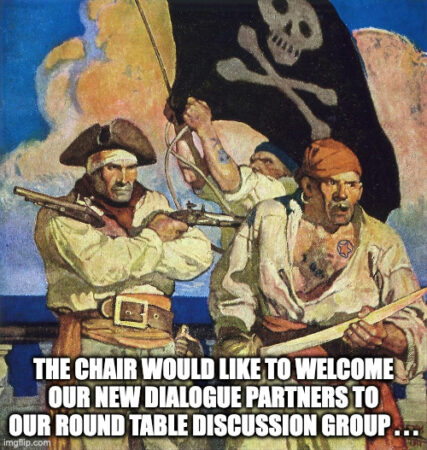Introduction
One of the great characteristics of modern Reformed preaching and teaching is that there appears to be a deep and abiding aversion to making any concrete applications. Sometimes various things are decorated as though they might be a matter of possible application, but this is illusory, like a heat shimmer off a highway in New Mexico in August. Your car blows right through it.

Were a preacher to come upon a congregation unawares, and give them a dose of any concrete or tangible things to do, saying it was because God wanted them to, the chances are pretty good that a good third of the assembled would go into anaphylaxis, with heels drumming on the floor and everything. A visiting charismatic cousin might even come to the conclusion that the church his Presbyterian cousin attends wasn’t half bad.
Fer Instance . . .
One time, many years ago, a bit of publishing business took me to another city, and I was there over a Sunday. My host took me to worship at his church, which was a big box evangelical church. The pastor of that church was something of a hot commodity at the time, that time being the eighties, and I remember being really struck by one aspect of the sermon.
The Scriptures were opened, the exegesis was solid, and the doctrine was sound, but the whole thing was still unsettled in a floaty kind of way. I remember telling someone later on that it was as though he fashioned a number of spikes in his forge, gave one to each parishioner, and then simply assumed that everybody would be good enough to take it home and drive it into their own hearts. There was no application.
And this really is the besetting sin of Reformed preaching today. It isn’t Reformed. This is the fault of evangelical preaching today. It isn’t evangelical. The only complaint I have with the pilot of this flight is that he won’t ever land, and it is getting pretty tedious up here in the air.
There are numerous reasons for this. They are afraid of being accused of legalism, they don’t want to “bind consciences,” and above all, they don’t want any trouble.
But the Puritans were not so. They would lay out the doctrine in painstaking detail. Having done so, they would turn to their next task, a most necessary task, which was to push those doctrines into every last application-cranny that they could find, doing their best to sound like the Westminster Larger Catechism when the divines were going good. Richard Baxter famously urged preachers to “screw the truth into their minds, and work Christ into their affections,” and Baxter was not hesitant to screw down every last plank in the lives of his listeners, as his Directory illustrates very well.
And Why Not?
Modern preachers won’t devote themselves to application, and why? The reasons range from caution to cowardice. Caution is in evidence when the preacher is trying to sidestep or avoid any mild disturbances in his otherwise placid week. Tee times wait for no man, and he doesn’t want to answer any more questions than he needs to. This sort of mild avoidance often works out because there are a whole lot of parishioners who want to be left alone every bit as much as the preacher wants to be left alone. They don’t want to ask questions any more than the preacher want to answer them.
And cowardice is in evidence when a preacher knows that to address Volatile Topic X in any biblical way would be like tossing a hand grenade into the goldfish bowl. He doesn’t want that reaction, or any reaction really, and so he assiduously avoids Volatile Topic X. To get into that, he says, would be to get into “politics.”
If a pastor stumbles into something like that, entirely by accident, the leadership team will have three days of meetings, devoting themselves to the most agonizing forms of damage control. You see, there was some unexpected but significant congregational push back, and then, disaster of disasters, somebody outside the church took notice of the gaffe and raised a stink online. And then, if the elders do come to a vote, and actually decide to back their pastor, they will vote to keep their heads down. Nothing needs to be done, knock on wood. And then the elders all go home and talk to their wives, which results in half of them sending emails and text messages to the others that say something like: “on reflection, I would like to revisit . . .” or “after much prayer I think we should . . .” or “over the years I have learned to rely on my most trusted counselor.”
The end result of all this pother, dither, and hugger-mugger is either that the pastor issues a groveling apology for having said “boys will be boys and girls will be girls,” in a sermon no less, with children present, or it sometimes happens that he will be thrown off the back of the sledge to fend for himself on the Russian tundra.
I’ve Got a Little List . . .
It would be cowardly and hypocritical—would it not?—to write anything like the foregoing and then not give any specifics. But like the Lord High Executioner in The Mikado, a highly entertaining hate crime from another era, I’ve got a little list.
Just how bad do the government schools have to get before the evangelical pulpits of America denounce them? The answer to that question is that they are not bad enough yet to get more than a small fraction of pulpits to address the corruption. These schools are the State Indoctrination Network (SIN), and so perhaps they ought to be addressed by their proper name. Perhaps this will finally happen when the pole dancing class, up to this point an elective, is made mandatory for all those who identify as girls.
Here’s another one, also education related. When the situation got dire enough, and numerous Christians banded together to plant a classical Christian garden in the much neglected topsoil of a decomposing West, it was not long at all before some enterprising Americans decided to make the whole thing more streamlined. But the choice is classical Christian education with a root ball, in fertile soil, on the one hand, and cut-flower classical Christian education in a Great Books vase—classical charter schools, the SCL vibe, the Hillsdale franchise, and so on. To be fair, not all of these efforts are cut-flower approaches. Some of them are relying on hydroponic technology to keep the plants going. And to change the metaphor, some (like the CLT) are living in a bad neighborhood with the doors unlocked and the windows upon. That won’t work out either, but at least there was an effort. This kind of half-assery is only possible because our pulpits have been deadly silent on the sins of secularism, syncretism, and sibilant attempts at alliteration. If our preachers were hot on the myth of neutrality, like they ought to be, this kind of thing would have no traction at all.
And when was the last time you heard a sermon on elder qualifications? You know, where the pastor mentions that Paul thought that an elder must “manage his household well” (1 Tim. 3:4-5), and that his children must not be hellions (Tit. 1:6). Were he to do this, there is concern that half the congregation might swivel in their seats to look at the preacher’s son, whose middle name is Hellion—after an uncle on his mother’s side.
I should also mention the tendency, when sin is mentioned at all, to bring it up as though sin only applies to people considered as bi-pedal carbon units, and not as men and women, or as boys and girls. When was the last time you heard any distinctively feminine temptations and sins called out? The men get called out as men all the time, especially on Father’s Day, and the favorite way of putting it is by telling them to “step up.” But the women are never urged to step up, even in those areas where the Bible has explicit cautions for women as women. So then, as a public service, allow me to mention that older women should be careful not to drink too much wine (Tit. 2:3), that they should guard themselves against the flattery of therapeutic counselors (1 Tim. 2:14), and they should make sure not to run down their husbands (Eph. 5:33). That should keep everybody busy for a bit.
And I suspect this problem with our preaching is only going to be exacerbated by AI getting into everything. So when will American preachers denounce the movement to start outsourcing the beginning of your sermon prep to AI? The link will enable you to see that Logos Bible Software thinks that AI shouldn’t write your sermons, but that “Sermon Assistant” is nevertheless here to help. The problem is that in order to preach a jeremiad like what is needed, Sermon Assistant might refuse to help, and then where would we be? But I cannot let this link pass by me without commenting on the context of it. This AI business was why that fellow was departing from evangelicalism for orthodoxy. He didn’t want some digital machine helping with the sermons, so he departed for greener pastures, where the Divine Liturgy does not require any sermon at all, or where the words are served up by someone who has been dead for 1600 years. That is like leaving evangelicalism because the pastor wears funny shirts for Roman Catholicism, where they wear funny hats instead.
Speaking of funny hats, one of the people who wears them was the Archbishop of Canterbury. Justin Welby, currently the lame duck archbishop, which is apparently a thing now, just recently resigned over a report that said that he had failed to report a really bad dude who was guilty of egregious sexual misconduct. This was all in the background, until it wasn’t, but right before this happened, Welby perpetrated his very own sexual misconduct—only this was of an “approved” kind—when he said that gay sex was okay if it occurred in the context of a “committed relationship.” Well, okay then. Going back to the scandal that led to Welby’s resignation, the girl bishop of Newcastle, Helen-Ann Hartley, had some words to say about it all, which included “line,” “drawn,” and “safeguarding.” So there’s that. All of this, taken together, including the mere fact of a girl bishop, indicates that the Church of England, on sexual and gender matters, is a weltering pile of hot garbage.
And how might this relate to our evangelical pulpits? Well, it is pretty simple really. Welby is at the bottom of a slippery slope, funny hat askew, down there with abusers, girl bishops, and imprimaturs and permission slips for sodomy, and evangelical pastors are ten feet down from the top of that same slippery slope, yelling something like, “You call that a header? Watch this!” Our evangelical guy would never say anything negative about girl bishops because Marie Tinkworthy, MDiv, director of his women’s ministry and valued member of his leadership team, might take it ill.


Our Book Giveaways

The Canon title being given away (Nov. 18-22) is my wife’s book, Learning Contentment. Before writing this book, Nancy had spent a number of years teaching women’s book studies through some great Puritan titles on the topic, such as Burrough’s Rare Jewel, and Watson’s All Things for Good. This book is a distillation of that sort of classic wisdom, translated for modern women.
Also, in the flurry of activity last week, I neglected to put up the link for C.R. Wiley’s great book, In the House of Tom Bombadil. Hope you found your way to that great title anyhow.
And in my Mablog shoppe, I am now giving away:
21 Prayers for Pastors on the Lord’s Day.
Letters of Marital Counsel, found here.
Proof as Moral Obligation
No Artificial Tweeteners
And new today . . .
N.T. Wright Rides a Pale Horse

